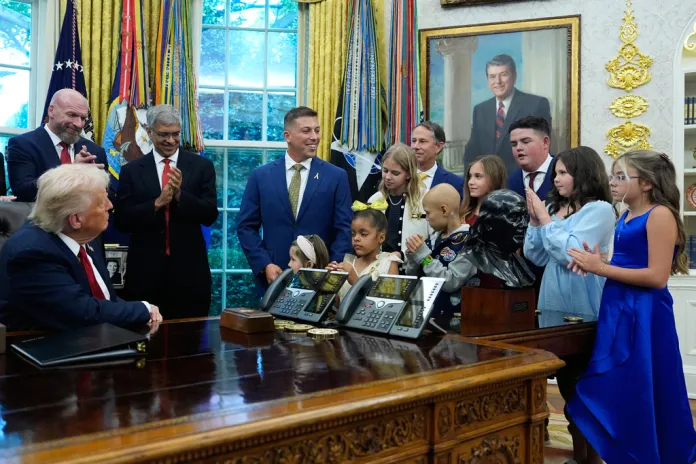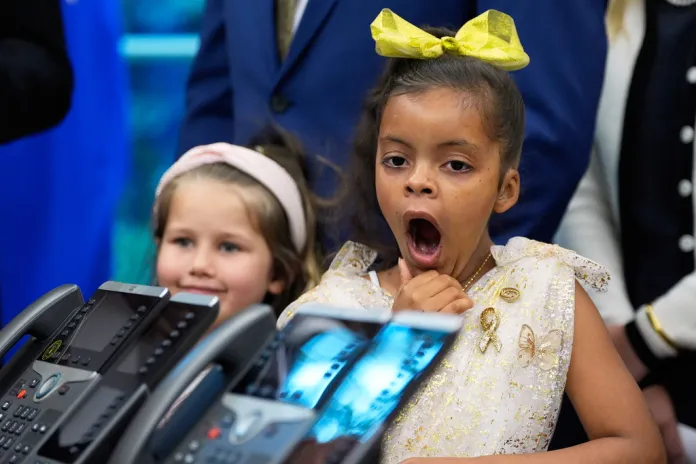


The Trump administration is pouring an additional $50 million into an existing data collection initiative to use artificial intelligence in pediatric cancer research, making ending childhood cancer part of the “make America healthy again” agenda.
On Tuesday, President Donald Trump signed an executive order for his Cabinet members on the MAHA Commission to work with the Office of Science and Technology policy to use AI to advance research on pediatric cancers and double funding for his Childhood Cancer Data Initiative through the National Institutes of Health.
Recommended Stories
- FDA launches campaign pushing over 300,000 retailers to pull illegal vaping products
- White House to announce 'TrumpRx' government drug retail site
- Louisiana sues California doctor over mail prescription of mifepristone
“We’re going to defeat childhood cancer, once and for all,” Trump said.
Although childhood cancer deaths in the United States have markedly declined since the 1960s, Health and Human Services Secretary Robert F. Kennedy Jr. said incidences of childhood cancer have grown more than 40% since 1975.
Nearly 15,000 children and adolescents under age 19 were expected to be diagnosed with cancer in 2024, according to the National Cancer Institute, part of the NIH. Of those, NCI estimated that 1,590 would die from cancer and that more than 1,000 of those cancer deaths would be children younger than 14.
In 2019, Trump launched the CCDI to connect existing data resources on childhood cancer patients. Although copious amounts of data have been collected over the past six years, synthesizing data from a variety of separate, incompatible databases has been a challenge.
Trump’s executive order will put an additional $50 million toward the CCDI, making its total budget $100 million, to use AI to overcome problems of incompatible datasets and allow researchers to use the data that is available more effectively.
“For years, we’ve been amassing data about childhood cancer, but until now, we’ve been unable to fully exploit this trove of information and apply it to practical medicine,” Trump said. “Using cutting-edge AI, we will empower scientists and researchers to discover new treatment and prevention strategies.”

NIH Director Jay Bhattacharya said at the event that the initiative will “rigorously push the boundary of science and bring hope to millions of families.”
“By uniting families, clinicians and researchers, by harnessing the power of AI, CCDI will accelerate diagnosis and treatment and develop the next generation of life-saving therapies,” Bhattacharya said. “This is not about collecting data alone. It’s about giving families hope.”
Bhattacharya told reporters before Trump signed the executive order that his agency will be directing research funds toward “using AI to understand how these childhood cancers biologically behave and how treatments can affect the outcomes for patients.”
The NIH director also told reporters Tuesday morning that the additional funding would be used to incentivize researchers to engage with data from the CCDI in new and innovative projects.
“The idea is to attract the very best scientific team to take advantage of the existing data as well as improve the data collection that we have,” Bhattacharya said before the signing.
Kennedy referenced the MAHA Commission report published earlier this month and its directive to the various agencies under HHS to better harness AI capabilities to “uncover causes, identify risk early and take action in childhood, in young adulthood, to prevent cancer.”
The HHS secretary said AI “will be integrated into HHS interoperability networks” to make “electronic health records and claims data work for patients and researchers.”
“No family should have to fight cancer with outdated tools or without access to the very best science,” Kennedy said. “For too long, families have fought childhood cancer while our systems lag behind.”
Several children who have survived various pediatric cancer diagnoses and their families spoke at the Oval Office event, sharing their personal experiences in fighting cancer and how important the increased funding will be for patient outcomes.
Josh Armstrong, father to Laurel, 6, from West Virginia, said his daughter was diagnosed with leukemia when she was 2, and she spent months undergoing grueling treatment, including chemotherapy, blood transfusions, and platelet transfusions.
“Because of this [order], doctors are going to be able to get better treatments faster to patients like Laurel,” he said. “And because of you making children like our real children, not cases or statistics with children like Laurel and all of these children here today, we have that hope, and we are so proud that you’re standing with children with cancer and making it a national priority.”

Carolyn Hendricks, 16, told Trump that she was diagnosed with pediatric bone cancer at age 4. Hendricks said the executive order will give childhood cancer patients “better options and so much more help for the future.”
“This will help doctors use technology to find cures faster, match patients to trials more quickly, and give our families more control over our health,” said Hendricks. “For kids with cancer, every day counts. This order shows that our lives matter enough to be first in line for innovation.”
Trump said that the money saved on pharmaceutical costs from implementing the most favored nation agreements to lower prescription drug prices will free up money to invest in childhood cancer research and other costly health projects.
“I think something that’s going to allow us to make a lot of progress is the money we’re saving on pharmaceuticals,” Trump said. “We’ll be saving 500, 600, 1,000%. Nobody’s ever heard of that.”
On Monday, Kennedy swore in Harvard oncologist Anthony Letai as the new director of the NCI, which oversees the CCDI.
TRUMP ‘MOST FAVORED NATION’ DRUG PRICE NEGOTIATIONS EXTEND PAST DEADLINE
Letai did not speak at the Oval Office event on Tuesday, but he said in a press release on Monday that the leadership of Kennedy and Bhattacharya is a “watershed moment for our nation’s public health.”
“We will work around the clock to identify cancer’s root causes, predictive biomarkers, and most effective treatments,” Letai said. “Advances in understanding cell death and replication are essential to realizing President Trump’s vision for a healthy America.”
